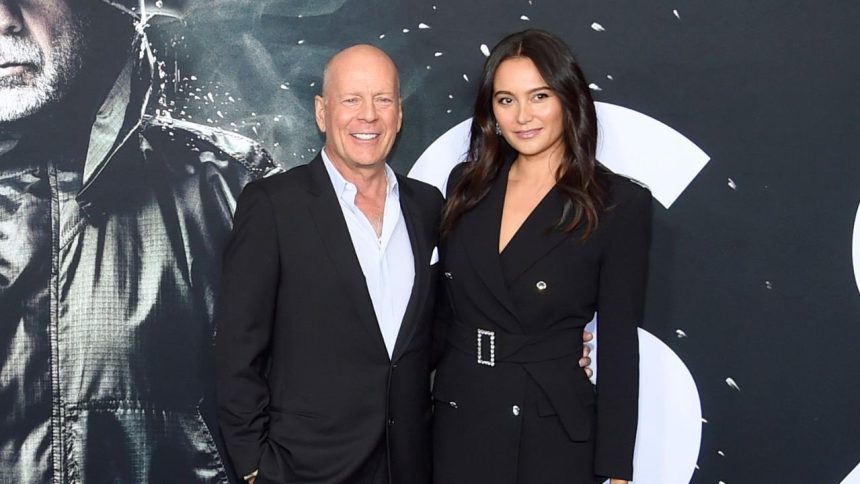Hollywood legend Bruce Willis’s wife has shared a bittersweet update about the actor’s health, noting that he still looks “healthy and vibrant” even as his brain decline continues due to frontotemporal dementia (FTD). Her words capture both hope and heartbreak, painting a vivid picture of a family navigating one of life’s hardest challenges.
For millions of fans who grew up with Willis in blockbuster classics like Die Hard, Pulp Fiction, and The Sixth Sense, this story resonates deeply—not just as news about a celebrity, but as a reminder of the universal struggle with aging, memory loss, and the human spirit’s resilience.
The Announcement That Shook Hollywood
When Bruce Willis’s family first revealed in March 2022 that he was retiring from acting due to aphasia, the news stunned Hollywood and his global fanbase. The condition, which affects language and communication, was later linked to frontotemporal dementia, a rare but devastating form of brain decline that impacts behavior, speech, and memory.
His wife, Emma Heming Willis, has been candid about their journey. In her most recent statement, she emphasized that while Bruce’s condition is progressing, “he still looks healthy” and remains the same loving presence in their home. Her honesty has drawn both sympathy and admiration.
Understanding Frontotemporal Dementia
Frontotemporal dementia (FTD) is less common than Alzheimer’s disease but equally destructive. It primarily affects people between the ages of 45 and 65, targeting the frontal and temporal lobes of the brain.
Symptoms include: changes in personality, difficulties with speech, impaired judgment, and memory challenges.
Statistics: According to the Alzheimer’s Association, FTD accounts for about 10–20% of dementia cases.
Impact: Unlike Alzheimer’s, which is often memory-dominant, FTD erodes behavior and communication first, making it especially difficult for families.
For a man whose career depended on dialogue delivery, timing, and charisma, the diagnosis feels particularly cruel.
Emma Heming Willis: A Wife, Caregiver, and Advocate
Emma Heming Willis has transformed from private spouse to public advocate. In interviews and on social media, she provides raw updates, shedding light on what life is like caring for someone with dementia.
She recently explained:
“Bruce looks healthy, and sometimes that makes it even harder for people to understand the seriousness of his condition.”
Her vulnerability resonates with caregivers worldwide. Studies show that nearly 6 million Americans live with dementia, and tens of millions of family members are directly affected as caregivers. Emma’s voice bridges the gap between Hollywood glamour and the everyday struggles families endure.
The Willis Family’s United Front
One remarkable aspect of Bruce’s journey is the unity of his blended family. His ex-wife Demi Moore, along with daughters Rumer, Scout, Tallulah, Mabel, and Evelyn, have rallied together.
Photos shared online depict family gatherings filled with laughter, singing, and togetherness, reflecting a conscious choice to focus on joy rather than decline. This public show of strength offers inspiration to countless families battling dementia behind closed doors.
Hollywood Reacts to Bruce Willis’s Battle
Bruce Willis is not just another actor—he is a cultural icon. His peers in Hollywood have expressed both sorrow and solidarity.
Sylvester Stallone, a longtime friend, admitted: “It’s killing me. Bruce is going through some really tough times.”
John Travolta, his co-star in Pulp Fiction, shared: “Bruce has given so much joy to the world. Now it’s our turn to support him.”
Fans, too, have flooded social media with messages, sharing memories of his movies and personal stories about how his work shaped their lives.
The Symbolism of “Appearing Healthy”
The phrase “Bruce Willis’s wife says he appears healthy despite ongoing brain decline” has struck a chord. It highlights the paradox many dementia families face: the outward appearance may not reflect the inner battle.
Doctors often stress that dementia is an invisible disease. Unlike visible injuries, the decline occurs quietly, within the brain, even as the body may seem strong. This disconnect can make it harder for outsiders to grasp the condition’s gravity.
Global Impact: Raising Awareness About Dementia
Emma’s openness has fueled conversations about dementia care globally. Experts note that over 55 million people worldwide live with dementia, and numbers are expected to triple by 2050 according to the World Health Organization.
Her advocacy—whether intentional or not—is pushing dementia into the spotlight. Charities have reported spikes in donations and engagement after her updates. In that sense, Bruce’s journey is not only personal but also educational.
The Cost of Caregiving
Financial and emotional strain are realities many families face when caring for dementia patients. In the U.S. alone, unpaid caregivers provided an estimated 18 billion hours of care in 2022, worth nearly $340 billion.
While the Willis family may have resources, Emma’s candor about the emotional toll resonates across all socioeconomic levels. She embodies both strength and vulnerability, two qualities millions of caregivers will recognize.
Looking Ahead: Can Hope Be Found?
Currently, there is no cure for frontotemporal dementia. Treatments focus on symptom management, therapy, and emotional support. Researchers are working on breakthroughs in gene therapy, drug trials, and brain stimulation, but solutions remain years away.
For Bruce, the emphasis is on quality of life. His wife has vowed to make every day meaningful, ensuring he is surrounded by love and positivity.
FAQs
What illness does Bruce Willis have?
Bruce Willis has been diagnosed with frontotemporal dementia (FTD), a rare brain disorder that affects communication and behavior.
Why did Bruce Willis retire from acting?
He retired in 2022 after struggling with aphasia, a condition that impairs communication, later linked to dementia.
What has Bruce Willis’s wife said about his health?
Emma Heming Willis said he “appears healthy” despite ongoing decline, highlighting the difficult reality of dementia.
How is the Willis family coping?
The family remains united, focusing on joy, shared moments, and supporting Bruce through love and care.
Is there a cure for frontotemporal dementia?
Currently, there is no cure. Treatments are supportive, though ongoing research offers hope for the future.
Conclusion:
The headline “Bruce Willis’s Wife Says He Appears Healthy Despite Ongoing Brain Decline” captures the bittersweet truth of his life today. While his health is fading, his presence, spirit, and legacy endure.
His story is not just about one man—it is about millions facing similar battles, families holding on to dignity, and the importance of compassion in the face of decline.
Bruce Willis may no longer be the action hero charging across screens, but in the quiet strength of his family’s love, he remains a hero in every sense.













